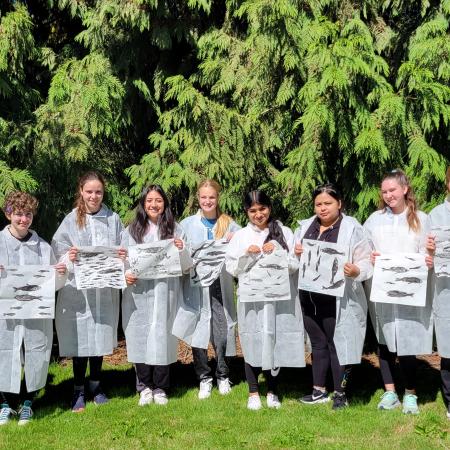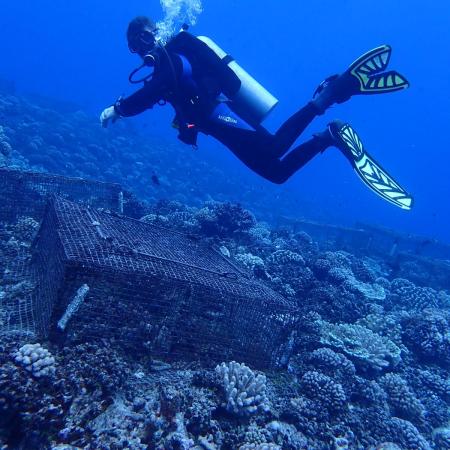Your program of coursework as an M.S. or Ph.D. student is jointly decided by you and your graduate committee. In your first year, you will take a set of core courses required of all microbiology graduate students.
You will otherwise have substantial latitude in choosing additional courses from among Microbiology (MB) listings and courses in other colleges and departments that are pertinent to your program. All microbiology and some other relevant graduate classes are listed below. (S=Spring; F=Fall, W=Winter); (cr=credit).
Required first year microbiology core courses
MB 507. SEMINAR (1 cr, all terms)
MB 511. SCIENTIFIC SKILLS (1 cr, F). Foundational skills for success in graduate school. You will also become familiar with ongoing microbiology research programs through attending colloquium. Course Syllabus.
MB 512. HIGHLIGHTS OF MICROBIOLOGY (1 cr, W). Designed to help you gain familiarity with the history of microbiology through reading, reviewing and writing about notable papers in the field. Course Syllabus.
MB 513. MICROBIAL SYSTEMS (3 cr, F). Presentation of a modern view of microbiology through the lens of microbes' influences on our planet's habitats and inhabitants. Discusses current research and the use of advanced techniques to illustrate how microbiology is contributing to many cross-disciplinary problems that can involve engineering, public health, sociology, ecology, geology, etc. Course Syllabus
GRAD 520. RESPONSIBLE CONDUCT OF RESEARCH (2 cr, all terms). Covers 10 topics in responsible conduct of research: ethical decision making; human subjects; animal welfare; data acquisition; sharing and ownership; research misconduct; conflicts of interest; authorship; peer review; mentor/trainee responsibilities; and collaborative science. Useful to all who conduct scholarly activity.
General Microbiology graduate courses
MB 516. IMMUNOLOGY (3 cr, F). Basic theory and applications of immunochemistry, immunogenetics, and cellular immunology. Examination of immunologically-related diseases. (Co-taught with MB 416).
MB 517. IMMUNOLOGY LABORATORY (1 cr, F). Laboratory on the applications of current immunological techniques. Concurrent enrollment in MB 516. (Co-taught with MB 417).
MB 520. MICROBIAL GENOMES, BIOGEOCHEMISTRY, and DIVERSITY (3 cr, W, odd years). A survey of microbial diversity from the earliest lifeforms to the modern role of bacteria and archaea in global biogeochemical cycles. Topics covered include molecular evolution, microbial genomics, biochemical diversity, and metabolic pathways that adapt cells to extreme environments. Particular emphasis is placed on marine systems, from photosynthesis in surface waters to life in the ocean crust. (Co-taught with MB 420). Course Syllabus
MB 530. BACTERIAL PATHOGENESIS (3 cr, S). Bacteria pathogenic for humans emphasizing the structural, physiological and genetic mechanisms of pathogenesis. Role of the immune system in pathogenesis and protection. (Co-taught with MB 430). Course Syllabus
MB 534. VIROLOGY (3 cr, S). Properties of viruses, their biology and pathogenesis. Emphasis on viruses causing human disease. (Co-taught with MB 434). Course Syllabus
MB 540. FOOD MICROBIOLOGY (3 cr, W). Role of microorganisms in food spoilage, infection, and intoxication; also basic principles in contamination control and germicidal treatment during processing, preparing, and distributing food for consumption. (Co-taught with MB 440). Course Syllabus
MB 541. FOOD MICROBIOLOGY LABORATORY (2 cr, W). Laboratory techniques to accompany MB 540. (Co-taught with MB 441). Course Syllabus
MB 548. MICROBE - ENVIRONMENT INTERACTIONS (3 cr, W, even years). A comparison of soil sediments and freshwater as microbial habitats. Discussion of the role of microorganisms in nutrient cycles, effects of microbial activity on plant and animal life. (Co-taught with MB 448). Course Syllabus
MB 555. BIOLOGY OF THE PROKARYOTES (3 cr, W, even years). An integrative course examining bacterial and archaeal life at different levels of biological organization, emphasizing current research and analysis of primary literature. The various life styles of prokaryotes are the common theme of the course. Topics include biofilms, cooperation and communication, development, stress responses, metabolic interactions involved in global nutrient cycling. Course Syllabus
MB 556. MICROBIAL BIOTECHNOLOGY (3 cr, W). Describes and analyzes the use of microorganisms as tools in everyday applications, in genetic engineering, and in medical, industrial, agricultural, and environmental processes. Provides an interdisciplinary introduction to the field, including current topics such as CRISPR, synthetic biology, biofuels and vaccines. Course Syllabus
MB 579. FERMENTATION MICROBIOLOGY (3 cr, S). An introduction to industrial microbiology with a focus on the physiology of fermentation and use of microorganisms for the production of food ingredients, fermented foods, and beverages. (Co-taught with MB 479). Course Syllabus
MB 580. GENERAL PARASITOLOGY (3 cr, W). Introduction to parasitology. The course emphasizes medical parasitology, but will cover a broad overview of parasitology, i.e., important groups and host/parasite relationships among all taxa from invertebrates to vertebrates, including mammals. (Co-taught with MB 480). Course Syllabus
MB 591. FISH DISEASES IN CONSERVATION BIOLOGY AND AQUACULTURE (3 cr, S). The course presents a broad overview of diseases of marine and freshwater fishes, covering important pathogen groups (viruses, bacteria, parasites, fungi), host/parasite relationships and disease ecology. Diseases important to aquaculture and ornamental industries as well as wild fish populations and conservation programs will be included. (Co-taught with MB 491). Course Syllabus
MB 599. COLLABORATIVE PROBLEM SOLVING IN BIOLOGICAL DATA SCIENCES (3 cr, SP). Gain research experience in analyzing large datasets with an interdisciplinary team. You will work in teams of students with faculty mentors to complete a research project. Course Syllabus.
MB 668. MICROBIAL BIOINFORMATICS AND GENOME EVOLUTION (4 cr, S). Theoretical and practical issues in microbial genome sequencing and annotation, with an emphasis on evolutionary theory and comparative analysis of microbial genome sequences. Metabolic prediction from genomes, with a population genetics perspective on comparative microbial genomics. Exploration of applications of genomics and allied tools to microbial popualtions, includng metagenomics, metaproteomics, and metatranscriptomics. Course Syllabus
MB 505/605. READING AND CONFERENCE (1-16 cr). This course is repeatable for a maximum of 16 credits.
MB 507/607. SEMINAR (1 cr). Graded P/N. This course is repeatable for a maximum of 9 credits.
MB 510/610. INTERNSHIP (1-16 cr). This course is repeatable for a maximum of 16 credits.
MB 501/601. RESEARCH (1-16 cr). This course is repeatable for a maximum of 16 credits.
MB 503/603. THESIS (1-16 cr). This course is repeatable for a maximum of 16 credits.
Microbiology students have substantial latitude in choosing courses from other colleges and departments for inclusion in their Program of Study. Some commonly selected courses are listed below.
Microbiology courses offered through the College of Veterinary Medicine
VMB 521. Animal Models (3 cr, S odd years)
VMB 523. Zoonoses (3 cr, S)
VMB 630. Mechanisms of Disease (3 cr, W)
VMB 631. Mathematical Modeling of Biological Systems (3 cr, F)
VMB 671. Molecular Tools (3 cr, S)
Molecular and Cellular Biology (MCB) Courses
MCB 525. Techniques in Molecular and Cellular Biology (intensive lab course) (3 cr, 2 weeks before F)
MCB 554. Genomic Organization, Structure and Maintenance (4 cr, F)
MCB 555. Genome Expression and Regulation (4 cr, W)
MCB 556. Cell and Developmental Biology (4 cr, S)
MCB 557. Scientific Skills and Ethics (3 cr, F)
MCB 637. Molecular Host-Microbe Interactions (3 cr, W)
Biochemistry and Biophysics
BB 590, BB 591, BB 592, Core Biochemistry Sequence (3 cr each, F,W,S)
Statistics
ST 511, ST 512, ST 513 Methods of Data Analysis and Continuation Courses (4 cr each, F,W,S)
ST 535. Quantitative Ecology (Multivariate Statistics) (3 cr, W)
ST 599. Statistical Methods for Genomics Research (3 cr, W)
Zoology
Z 594. Community Ecology (5 cr, W, odd years)



